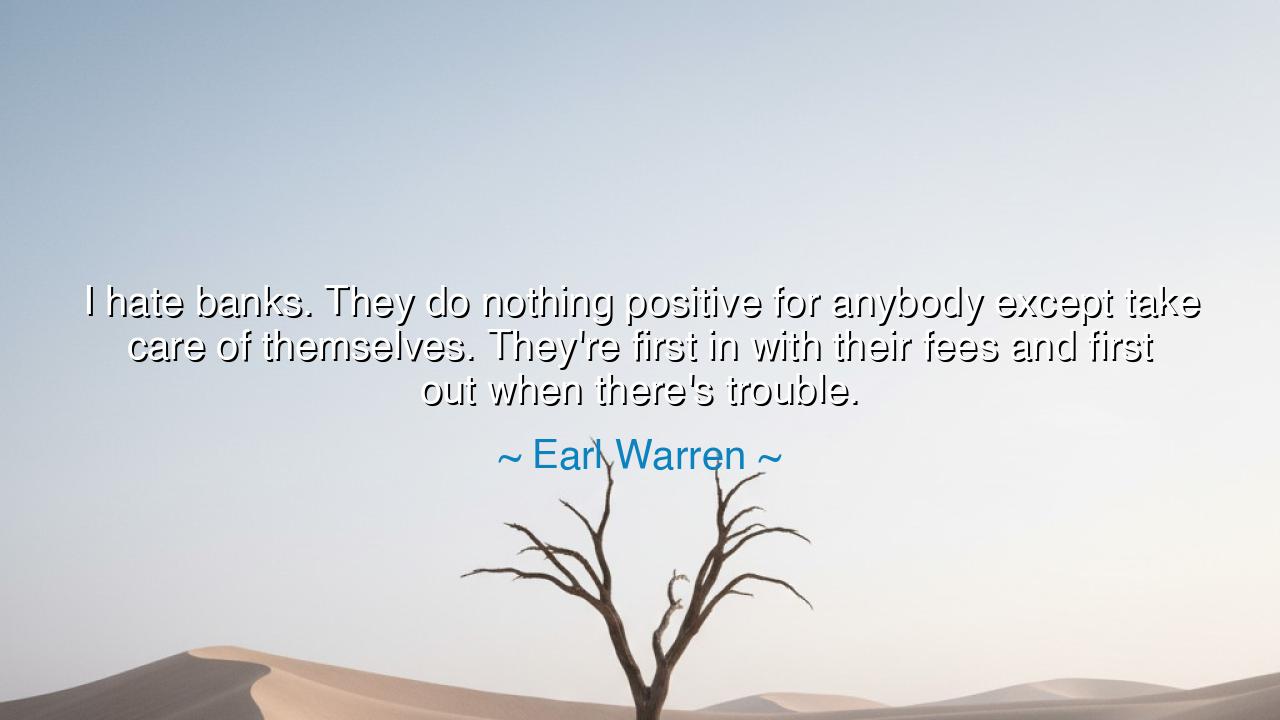
I hate banks. They do nothing positive for anybody except take
I hate banks. They do nothing positive for anybody except take care of themselves. They're first in with their fees and first out when there's trouble.






Earl Warren, Chief Justice and guardian of civic conscience, once declared: “I hate banks. They do nothing positive for anybody except take care of themselves. They're first in with their fees and first out when there's trouble.” In these fierce words burns the anger of a man who had seen the suffering of ordinary people weighed down by institutions meant to serve them. He spoke not against money alone, but against the cold-hearted machinery of banks, which too often demand tribute in times of plenty yet vanish in times of hardship.
The essence of his saying is a warning against greed disguised as service. For while banks proclaim themselves guardians of wealth, Warren observed that they act foremost as guardians of their own power. They are quick to demand fees, but when storms arise, they retreat, leaving the common man defenseless. His words reflect the eternal suspicion of the people toward those who profit not from labor or creation, but from holding and hoarding.
History provides grim witness to this truth. During the Great Depression, thousands of banks collapsed, wiping out the savings of families who had trusted them. Farmers, laborers, and widows were cast into ruin, while many of the bankers themselves escaped with wealth intact. It was not the banks who stood by the people, but leaders who rose to curb their power, such as Franklin D. Roosevelt with his reforms, and new protections like the FDIC, built to ensure that the people’s trust would not again be so easily betrayed.
Warren’s fury also echoes the voices of prophets and philosophers of old. In the temples of Jerusalem, Christ overturned the tables of the moneychangers, declaring that greed had defiled a sacred place. In the same way, Warren condemns institutions that feed upon the many to enrich the few. His words are not mere complaint—they are a call to vigilance, to resist the quiet tyranny of gold when it rules without compassion.
Let this wisdom be passed to future generations: wealth is not evil in itself, but when those entrusted to guard it serve only themselves, they become predators, not protectors. Banks and all institutions of power must be judged not by their words, but by their deeds in times of crisis. As Warren taught, beware those who are “first in with their fees and first out when there’s trouble,” for such allies are no allies at all. True strength lies in communities, in justice, and in leaders who remember that prosperity must serve the people, not devour them.






LRcon lon roi
Warren’s perspective is harsh, but it mirrors a widespread feeling that banks are more concerned with profits than helping people. The criticism that they charge fees and withdraw when people face financial trouble is tough but seems justified for many. But is it possible to view the banking sector as a necessary part of modern economies, even if it has some serious flaws? Can we demand reforms without losing sight of the role banks play in economic growth?
TNTien Nguyen
It’s hard to ignore the frustration in Warren’s statement about banks, especially when considering how often people are charged for services that don’t seem to offer value. The idea that banks abandon their customers when things go wrong reflects the public’s skepticism about the banking system. Is there a way to reform banking practices to better serve the public interest, or are the profit-driven motives too deeply embedded to allow meaningful change?
HTHuyen trang
Warren’s criticism of banks is both harsh and, to some, likely relatable. The idea that they 'take care of themselves' and exploit consumers with high fees is a sentiment many share. However, how much of this view is due to the actions of a few bad actors within the banking industry? Do we risk overlooking the potential benefits that banks can offer in terms of financial services and stability if we focus only on their flaws?
SZSu Zie
Warren’s disdain for banks taps into a frustration that many people feel about the financial system. It seems that banks have earned a reputation for being more concerned with profit than with helping individuals, especially during times of crisis. But are all banks truly the same? Are there examples of banks doing positive work for their communities, or has the financial industry become too entrenched in its own practices to change?
GDGold D.dragon
Earl Warren’s comment on banks expresses a deep cynicism toward the financial system, and it’s easy to see why. Many people feel that banks prioritize their own interests over those of their customers, especially when you consider fees and how they often pull back when people need help the most. But can we really blanket all banks with this criticism? Are there institutions that are trying to create a more ethical and customer-friendly approach?